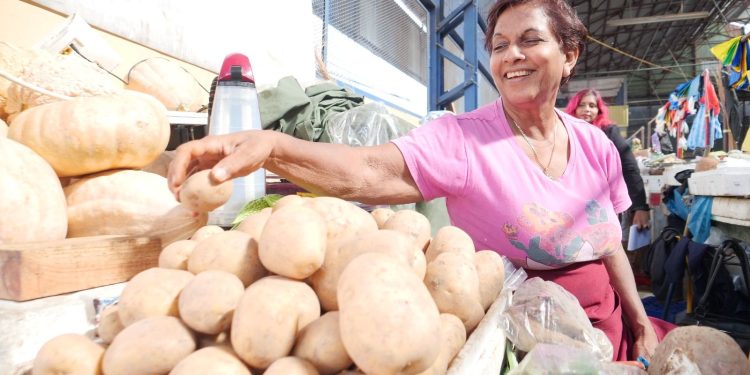Potato prices have skyrocketed to unprecedented levels over the past two months, leaving consumers and vendors grappling with the economic impact. While there has been a slight dip in prices this week, experts and vendors are now urging the Ministry of Agriculture to step in and promote the cultivation of locally grown potatoes to mitigate the crisis.
In recent times, Trinidad and Tobago has witnessed a shocking surge in potato prices that has left both vendors and consumers in a state of distress. The cost of this dietary staple has nearly doubled since July, pushing many to explore alternative options such as breadfruit and eddoes. This alarming escalation in potato prices has not only strained household budgets but also highlighted the vulnerability of the nation’s food supply chain.
The Current Potato Price Crisis
Leading agronomist, Akanath Singh, emphasizes the need for a proactive approach to address this issue. He firmly believes that Trinidad and Tobago has the potential to produce its own potatoes on a larger scale, provided the right growing conditions are met. Singh also points out the availability of locally sourced fertilizers and organic bio-stimulants that can boost potato production.
Wholesale vendors at the San Fernando Central Market, like Visham Mahabir, have felt the pinch of rising potato prices. A 50-pound bag of potatoes, which sold for $60 to $80 last year, has now surged to $200 to $250. Retail vendors, such as Radica Arjoonsingh, are forced to pass on these exorbitant costs to consumers, with a bag of 50 pounds now retailing for as high as $200. This dramatic increase in prices has led consumers like Dexter George to question the feasibility of importing potatoes when local cultivation seems like a viable solution.
Anil Boodram, another vendor, highlights the fluctuating nature of potato prices and attributes the price hike to high demand. However, he notes that prices have started to drop recently, offering some respite to consumers.
The Potential for Local Potato Cultivation
In Biche, gardener Judy Narine-Persad has taken matters into her own hands by cultivating Irish potatoes. Her success story demonstrates that it is possible to grow potatoes on a smaller scale in Trinidad and Tobago. With a harvest timeline of three to four months, it’s evident that local cultivation can help alleviate the pressure caused by the erratic potato prices.
Government Initiatives and Future Prospects
Agriculture Minister Kazim Hosein sheds light on the government’s efforts to address this crisis. Over the last five years, the Ministry has been evaluating various potato varieties to determine their suitability for local production. Recent developments include the identification of heat-tolerant and disease-resistant potato varieties from Germany. The Ministry, in collaboration with the Inter American Institute for Cooperation in Agriculture (IICA), is working to import and evaluate these varieties for potential commercial production under local conditions.
The soaring prices of potatoes in Trinidad and Tobago have undoubtedly created a significant burden on both consumers and vendors. Calls for the Ministry of Agriculture to support local cultivation are growing louder, especially as success stories like Judy Narine-Persad’s demonstrate the feasibility of producing potatoes locally. The government’s efforts to evaluate new potato varieties also show promise for a more sustainable future.
As the nation grapples with the potato price crisis, it is crucial to consider the long-term benefits of reducing dependence on imports and bolstering domestic production. By fostering a conducive environment for potato cultivation and providing support to local farmers, Trinidad and Tobago can take a significant step towards ensuring food security and stable prices for this essential commodity.
#PotatoCrisis #Agriculture #FoodSecurity #LocalCultivation #TrinidadAndTobago #PriceSurge #GovernmentInitiatives #DomesticProduction #FoodSupplyChain







